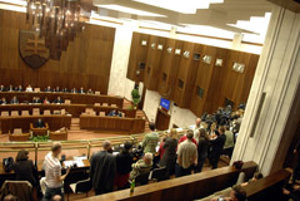When the ruling Smer party gathered at its rally in Trenčín last December, their chairman, Robert Fico, threatened to end "media terror and lynch" journalists by means of reintroducing the right of reply in the Press Code. His intentions have since materialised into a draft amendment.
Media analyst Radovan Kutaš considers the amendment, submitted to the parliament by Smer MPs, politically motivated and dangerous.
"The right of reply, as it is formulated now, is dangerous because it also arises in relation to true information," said Kutaš of the Media Institute, adding that a formulation, which would allow for the right of reply to be granted only in the cases of incorrect or incomplete information, is missing in the draft amendment to the Press Code.
Danko wants to reply to commentaries
Speaker of Parliament Andrej Danko (SNS) also supports the proposal. Besides Fico, Danko is the next politician to pick the media outlet and questions he will respond to.
"In addition, the proposal will be extended to commentaries and columns," Danko's spokesperson Tomáš Kostelník told Sme.
Danko refers to the developed countries and the European Union, where he says such a law is a matter of course.
The draft law, submitted to the parliament by Smer MPs Miroslav Číž and Dušan Jarjabek, reads the right of reply only applies to factual claims damaging one's honour or good reputation and excludes the right of reply to opinion pieces.
Kutaš perceives Andrej Danko's intention as disputable.
"Columns and commentaries are journalistic genres, which can also contain factual claims," said Kutaš, admitting he has no idea what Danko meant by his statement. "However, if he confuses it with judgement, it is absurd."
 Controversial Press Code passed; media mourn Read more
Controversial Press Code passed; media mourn Read more It is hard for Kutaš to imagine how a politician would defy a commentator's opinion. In other countries like the Czech Republic, the right of reply morphs into the right of correction, Kutaš added.
The International Press Institute has pointed out, for example, the USA does not recognise the right of reply and media outlets should be free to decide what they will and will not publish.
Following the murder of journalist Ján Kuciak and his fiancée Martina Kušnírová, Slovakia fell ten places in the press freedom list to 27th place.
Haraszti: Courts do not accept the right of reply to opinions either
Smer approved the right of reply within the Press Code in 2008. The then-culture minister Marek Maďarič, who recently left Smer, submitted the bill to the parliament.
In protest of the law, Slovak dailies published blank front pages in 2008. Although Fico pledged the law was not meant to serve him or other politicians, he used it in 2009, demanding the right of reply to a commentary in Sme.






